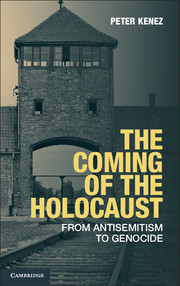Book contents
1 - French Jews
Published online by Cambridge University Press: 05 June 2014
Summary
In history there is no such thing as a tabula rasa – every event, every movement, every ideology has precursors – yet there are also major turning points. It is a commonplace to assert that the French Revolution was one of these turning points and that the modern age began with it. In reality, of course, the changes that made the French Revolution possible, such as the strengthening of the middle classes in Western Europe, the weakening of religious authority, and the questioning of religious dogma by intellectuals – developed over the course of centuries. Philosophers articulated changes that were already taking place and prepared the soil for the great Revolution. Enlightenment thinkers argued that the organization of societies could and should be based on reason, as opposed to tradition or dogma, and that people should be treated as individuals, rather than as members of an estate, a group with defined rights and obligations. The consequences were momentous and never ending. (This is perhaps what Zhou Enlai had in mind when he said that it was too early to evaluate the French Revolution.)
The idea that people should be treated as individuals rather than as members of a social, political, or religious entity was indeed revolutionary. It necessitated rethinking the very concept of a nation, which in the past had been defined as the politically conscious nobility (together with the Church and some representatives of the Third Estate). The new understanding of “nation” included everyone who was part of a cultural community. At least in theory, everyone became an equal citizen. Almost immediately the question arose whether under these circumstances Jews belonged to the nation or were a foreign body tolerated within the borders of a country. After all, Jews spoke a different language from the surrounding population and claimed to have their own separate history. In some countries, for example, pre-unification Germany, or in Central Europe, the question was particularly difficult, because the limits of cultural community were ill defined.
- Type
- Chapter
- Information
- The Coming of the HolocaustFrom Antisemitism to Genocide, pp. 11 - 29Publisher: Cambridge University PressPrint publication year: 2013



